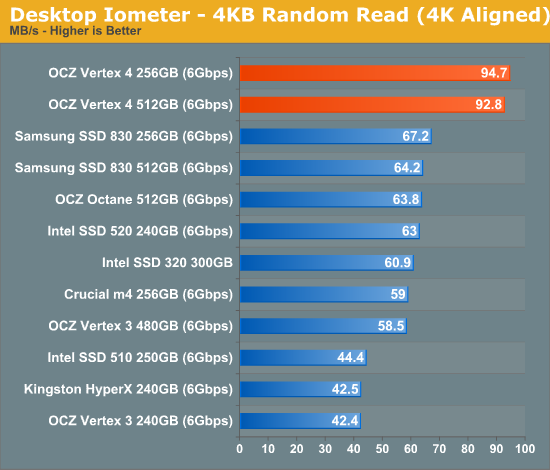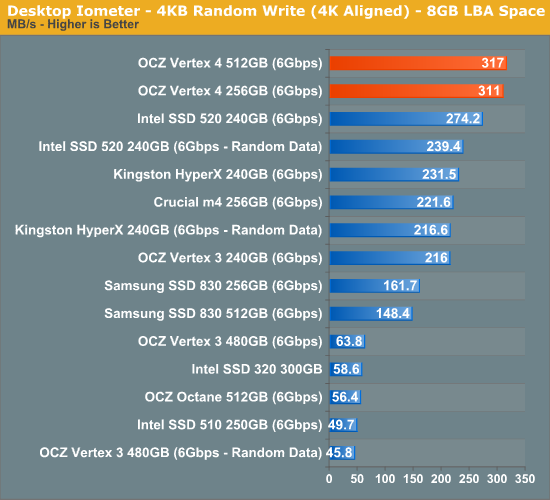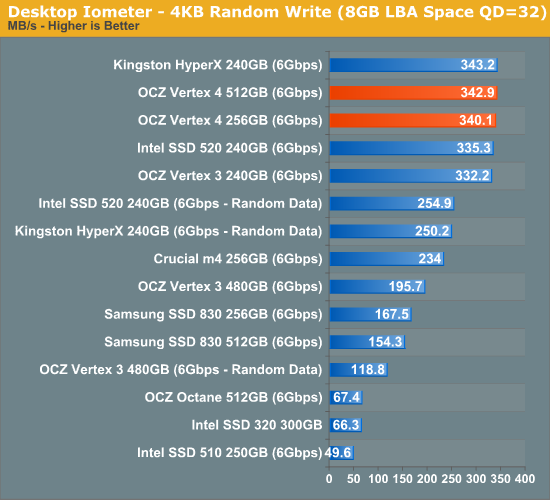OCZ Vertex 4 Review (256GB, 512GB)
by Anand Lal Shimpi on April 4, 2012 9:00 AM ESTRandom Read/Write Speed
The four corners of SSD performance are as follows: random read, random write, sequential read and sequential write speed. Random accesses are generally small in size, while sequential accesses tend to be larger and thus we have the four Iometer tests we use in all of our reviews.
Our first test writes 4KB in a completely random pattern over an 8GB space of the drive to simulate the sort of random access that you'd see on an OS drive (even this is more stressful than a normal desktop user would see). I perform three concurrent IOs and run the test for 3 minutes. The results reported are in average MB/s over the entire time. We use both standard pseudo randomly generated data for each write as well as fully random data to show you both the maximum and minimum performance offered by SandForce based drives in these tests. The average performance of SF drives will likely be somewhere in between the two values for each drive you see in the graphs. For an understanding of why this matters, read our original SandForce article.
Random read performance is staggering - a good 40% higher than anything else we've tested. While the cutoff for usefulness on a client drive is likely much lower than what even the Octane could deliver, this sort of performance bodes very well for OCZ's enterprise ambitions.
Randomly write performance is also just excellent. SandForce's peak numbers come close, but throw in any sort of incompressible data and they quickly take a step back while the Vertex 4 is able to deliver. Again, I'm actually more interested in these numbers from an enterprise workload standpoint but heavy client users will definitely not be disappointed.
Many of you have asked for random write performance at higher queue depths. What I have below is our 4KB random write test performed at a queue depth of 32 instead of 3. While the vast majority of desktop usage models experience queue depths of 0 - 5, higher depths are possible in heavy I/O (and multi-user) workloads:
SandForce always scaled well at higher queue depths, but again we're looking at best case performance for the SF-2281. Move towards incompressible data and the Vertex 4 is alone at the top.













127 Comments
View All Comments
hechacker1 - Wednesday, April 4, 2012 - link
I'm not really sure if they are buffering that much data. I'm betting a lot of it is to cache the state of the available flash (tables and bitmaps), and to provide lots of room so you can use memory intensive algorithms to allocate, sort, and combine data before it gets place on the flash.Even with some cache, just because the SSD is so fast, it's going to empty it in 1 second.
vegemeister - Monday, May 7, 2012 - link
As long as it's not too much RAM to write out before the energy in the caps runs out, it's not really a problem.7Enigma - Wednesday, April 4, 2012 - link
But you can show all these pretty specs and graphs but until you fix something like this catastrophe I will avoid your SSD's like the plague:Oh and what controller is in this beauty......Indilinx Everest!
http://www.newegg.com/Product/Product.aspx?SID=PSa...
Comdrpopnfresh - Wednesday, April 4, 2012 - link
It's nice to see the AES-256 encryption on it. That'll come in handy when the drive dies and has to be sent back to OCZ.I have 2 vertex2's and a vertex3, all of which died, and I have yet to eat or rma- OCZ provides no way to fulfill the warranty without compromising the security of user data. Used to be a big fan of OCZ, and loved their ssds... until this situation arose THREE TIMES.
vegemeister - Monday, May 7, 2012 - link
Sure they do -- encrypt it yourself in software. Anyway, why would you trust OCZ not to be able to decrypt data encrypted by closed-source firmware designed by OCZ?Hurk - Wednesday, April 4, 2012 - link
where is the data for the 128gb version? it will be significantly different from the 256/512, and since im really loving SSD caching on new system builds, the smaller drive is more important to see the numbers for than the 256/512 for me.Kristian Vättö - Wednesday, April 4, 2012 - link
Manufacturers often send bigger capacities for reviews (they are the highest performing ones, after all). I'm sure there will be a 128GB review once we get one, which is hopefully sooner than later :-)Reikon - Wednesday, April 4, 2012 - link
Nice referral link there.JarredWalton - Thursday, April 5, 2012 - link
No worries -- they've been marked as spam and are gone now. Let this serve as a warning to others: if you try to put in a referral link in a comment and we mark you as spam, all your comments go bye bye!iceman98343 - Thursday, April 5, 2012 - link
sorry about that. c an you delete my last entry below. didn't see any TOS against referral links.